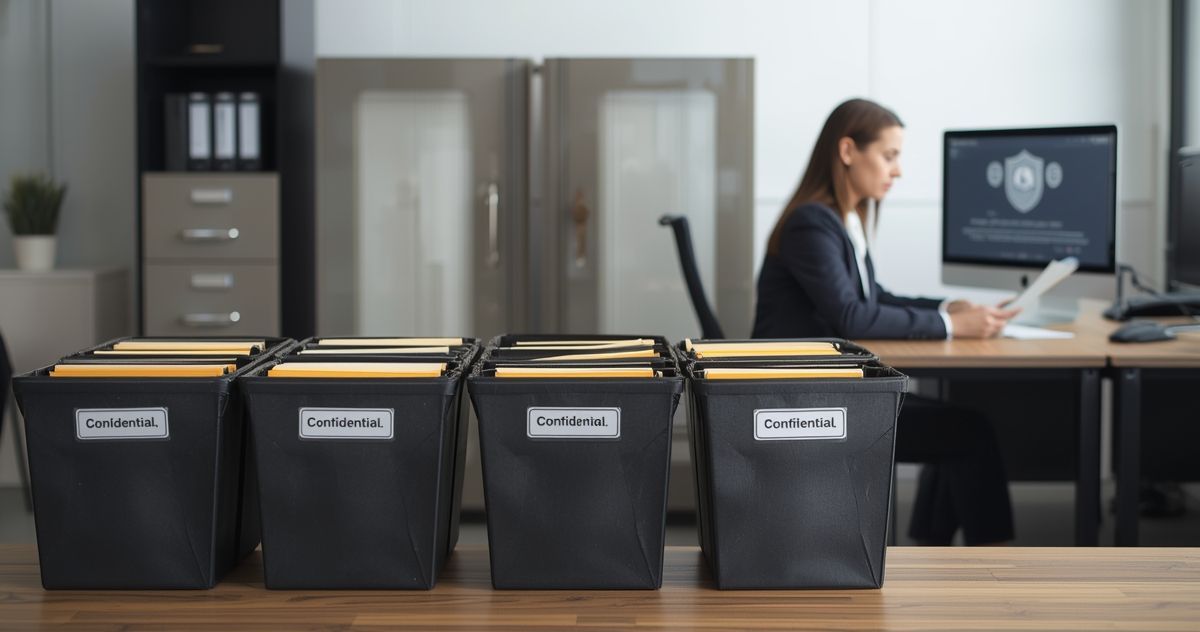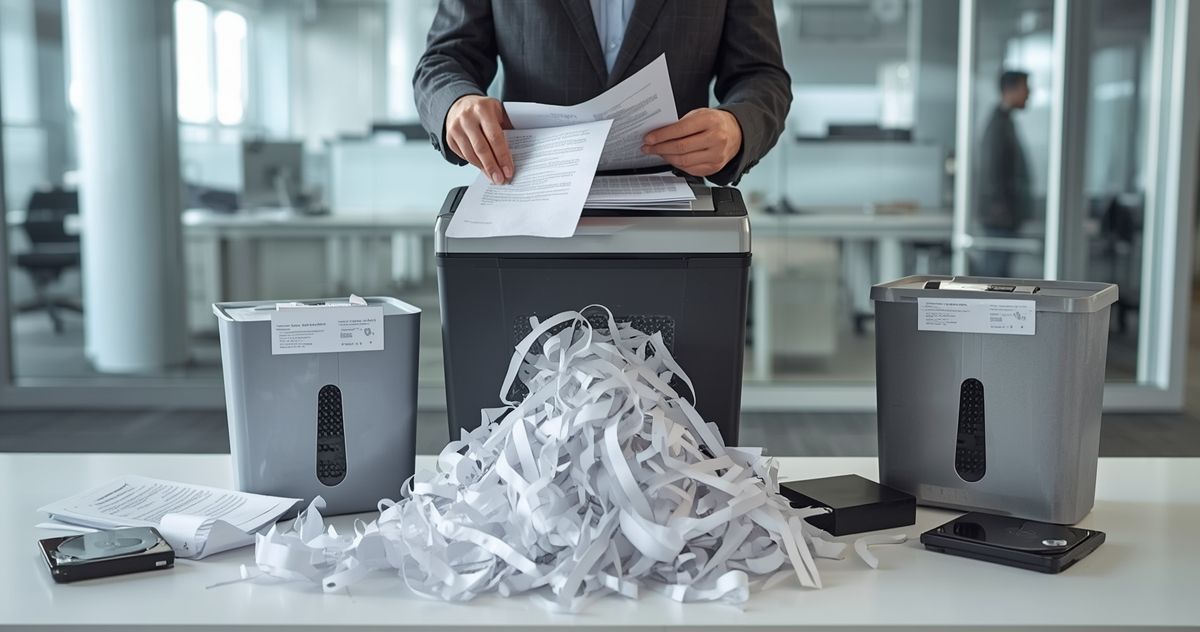GLBA and Paper Records: The Overlooked Risk for Financial Institutions
GLBA and Paper Records: The Overlooked Risk for Financial Institutions
When financial institutions think about safeguarding sensitive data, digital security tends to dominate the conversation. But while cybersecurity measures for electronic data get most of the attention, what about paper records? For banks, loan providers, and other financial organizations, improper handling of physical documents presents a significant, often overlooked, risk.
The Gramm-Leach-Bliley Act (GLBA) ensures that financial institutions are responsible for protecting customer information, not just in its digital form but on paper as well. Neglecting this can lead to severe consequences, from hefty fines to reputational damage.
But why is this a growing concern, and how can your organization ensure compliance by managing physical records properly?
What Does the GLBA Say About Data Protection?
The Gramm-Leach-Bliley Act (GLBA), enacted in 1999, requires financial institutions to protect the security and confidentiality of their customers’ nonpublic personal information (NPI).
With GLBA, safeguarding customer data applies to both physical records and digital formats. Any sensitive data stored in paper documents, like loan applications, account details, or tax forms, is subject to the same level of stringent security required for electronic files.
For compliance under GLBA, financial institutions must implement a written information security program (WISP) that includes the following measures:
- Employees are trained: Your staff must receive training on securely handling sensitive customer information.
- Physical and digital safeguards are in place: This includes restricted access to storage areas and timely destruction of paper records using approved methods.
- Ongoing assessments: Security practices should be regularly reviewed and updated.
Why Are Paper Records Still a Risk in the Digital Age?
Despite most institutions moving toward digital operations, paper-based records remain a widespread practice, especially in customer-facing offices, legal documentation, and backup filing systems.
The dangers of relying on paper records include:
- Lost or misplaced documents that are difficult to trace.
- Improper disposal methods leading to data breaches, such as tossing sensitive documents into dumpsters.
- Unauthorised access from employees, contractors, or external individuals due to poor physical safeguards.
These risks make it imperative for institutions to ensure that paper records are properly protected and destroyed when no longer needed.
The Importance of Secure Disposal for Paper Records
One significant weakness for financial institutions is failure to manage the lifecycle of sensitive records. Documents eventually reach their end of use, but improper methods of disposal (like shredding paper at home or tossing it in general trash) can open the door to data breaches.
Proper disposal practices, such as secure paper shredding, ensure that sensitive information cannot fall into the wrong hands. Collaborating with specialized shredding services ensures all records are completely and compliantly destroyed.
Why Choose a Professional Shredding Service?
A reliable, professional shredding company, such as DataShredder Corporation, offers financial institutions guaranteed security and peace of mind when it comes to document disposal. These companies provide compliant solutions by ensuring your paper records are:
- Shredded beyond recognition so they cannot be reconstructed.
- Disposed of in compliance with privacy laws like GLBA, as well as other regulations like FACTA.
- Managed with strict chain-of-custody protocols to eliminate opportunities for mishandling.
DataShredder, for example, offers shredding services tailored to various industries—including financial organizations—to meet these compliance requirements and provide easy, efficient disposal.
Hard Drives vs. Paper Records: Risks to Watch Out For
Companies often prioritize hard drive data destruction services for digital compliance but fail to recognize that paper documents pose an equally severe threat. Hard drives and digital media must be securely disposed of to protect electronic data, and this same diligence should extend to paper.
Just as partnering with a paper shredding company can ensure compliance with electronic security regulations, adopting similar practices for physical document shredding protects your organization from unnecessary exposure.
Actionable Steps for Ensuring GLBA Compliance with Paper Records
Making paper security a priority doesn’t need to be complicated. Here are some streamlined steps to get started:
1. Identify Sensitive Documents
Conduct a thorough audit of your office to identify all paper records that contain nonpublic personal information (NPI). These records may include sensitive data such as financial details, personal identification numbers, or confidential client information, all of which require secure disposal or proper safeguarding to ensure compliance with privacy regulations and protect against unauthorized access.
2. Train Employees
Ensure your team understands the risks of mishandling paper records, such as data breaches, identity theft, and privacy violations. Provide them with proper training on secure handling practices, including limiting access to sensitive documents, and emphasize the importance of shredding or securely disposing of records when no longer needed.
3. Partner with a Shredding Service
Work with a professional shredding company to ensure your documents are securely destroyed and meet all compliance requirements. These companies use advanced shredding techniques to protect sensitive information, helping you avoid data breaches and potential legal issues.
Many services also offer regular shredding schedules, making it easier to maintain a consistent and secure document disposal process without added stress.
4. Communicate Policies Consistently
Regularly review and update your document retention and destruction policies to ensure they remain in line with the latest compliance standards and legal requirements. This process helps protect sensitive information, avoid potential legal risks, and maintain an organized system for managing your records effectively.
Secure Data Disposal with DataShredder
Whether it’s digital or paper-based threats, having a dependable partner for data destruction ensures compliance, security, and peace of mind. DataShredder Corporation specializes in both hard drive disposal services and secure shredding of physical documents for financial institutions. Our services guarantee data remains protected at every stage, from storage to final destruction.
By choosing an expert provider, you’re not just mitigating risk; you’re solidifying trust and credibility with your customers.
Safeguard Your Institution Today!
GLBA compliance isn’t an option; it’s a necessity. Don’t overlook the role of paper records in securing your organization’s reputation and customer trust.
Take the first step today by contacting DataShredder to securely manage and destroy sensitive data. Our expertise in both hard drive destruction and
residential paper shredding services ensures your information is in safe hands, leaving you free to focus on what matters most.











Share On: